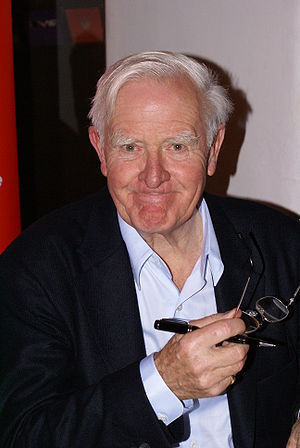Michael Patrick Clark's Blog, page 7
September 3, 2012
On interfering politicians, Daphne du Maurier, and a plea for the humble seagull.
Some men are born great, some achieve greatness, and some have greatness thrust upon them. If your name is Malvolio or ‘Teddy’ Roosevelt you can legitimately make such a claim, but what about all those others who go in search of greatness for its own sake?
I have no problem with them. Ambition can be a curse, but it can also offer motivation, inspiration, and even comfort, in the pursuit of excellence.
You see, I don’t care how ambitious, or star struck, or bohemian, or avant-garde, or downright quirky, people might be, just so long as they aren’t interfering with my life or hurting others.
But what, I hear you ask, about those ambitious people who seek to interfere and, in some cases, actually govern our lives?
These people are different. These people are politicians, irrespective of their particular brand of rhetoric, or grandiose titles, or clawed responsibilities. They are politicians, and would smell the same by any other name. Presidents, ministers, prime or otherwise, secretaries of this, secretaries of that, judges, magistrates, mayors, councillors, committee members, the list goes on ad infinitum and ad nauseum.
The Scottish comedian, Billy Connolly, a man not unfamiliar with ambition, once joked that ‘the desire to be a politician should actually bar you from ever becoming one’. I have to agree. While understanding the need for responsible government, in all walks of life, I do feel that politicians should be reluctant servants rather than ambitious masters.
With that said, I guess the fact that I have clashed with these people throughout my life will come as no surprise to you. This was just another such occasion.
Now, I have always loved animals. I feel that, as arguably earth’s most intelligent life form, the Human Race should look after and care for its fellow creature. I also believe that this de facto responsibility should encompass every creature, from the tiniest insect to the greatest mammal.
Which brings me to seagulls.

I can understand how Daphne du Maurier gained inspiration from Cornwall’s sea birds. They are noisy, quarrelsome, impudent, larcenous, aggressive, and, given half a chance, will crap all over both you and your ice cream. . . but, despite all that, or maybe because of all that, I rather like them.
We have a family of seagulls living in our chimney, or to be more precise between the pots of our chimney. My wife, Pam, christened the mother ‘Jackie’, don’t ask me why, and ‘Jackie’ immediately became a sort of extension to our family. Or again, to be more precise, we became an extension to hers. Every now and then we’ll hear a high-pitched squeak emanating from the chimney breast, and know that ‘Jackie’ will soon be knocking on the door, because she has another fledgling to feed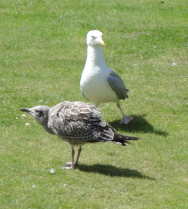
You don’t believe the ‘knocking on the door’ bit? I promise you it’s true. I’ll be upstairs, working in my study. Pam will be downstairs, working in hers, and we’ll hear it; a continual tap, tap, tapping on the French doors leading to our back garden.
Into the kitchen we go, and there ‘Jackie’ will be; sitting on the back step, peering through the glass, and waiting for her food. Over the years it has become something or a ritual. Just as, a few weeks later, the appearance of mottled infant with neck not yet fully extended, and proud mother warding off all the other seagulls, will herald a welcome cessation to the tapping.
Which is part of the reason that I became so incensed when I received a letter from the County Council, ordering me to stop feeding the birds.
In truth, there is something of a history to this. A few years ago my neighbour, whom I was never especially enamoured of, extended the spikes he’d installed on his roof, to the fencing between our two properties. On the roof he’d installed them to impale the webbed feet of seagulls. On the fence he’d installed them with the specific purpose of impaling my Burmese cats.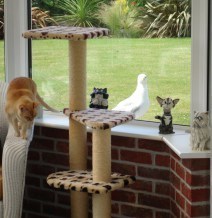
A major row ensued. I threatened to impale a specific aspect of his anatomy with one of his own spikes, and we’ve not spoken a civil word to each other since.
But then, as with so many petty conflicts, the situation worsened.
Apparently my interfering neighbour had decided to escalate our particular Cold War to open confrontation at the thirty-eighth chestnut paling. To this end he brought in the not inconsiderable interference of Cornwall County Council’s very own Joseph Stalin; to dictate how I, and my extended family, lived our lives.

‘Stalin’ advised me that he had ‘received reports’ of me feeding birds, and in particular feeding seagulls. He went on to say that I should immediately desist, or face the considerable wrath of the elected ‘local authority’, which I assumed to be something akin to the tanks rolling into Prague in 1968.
I wasn’t having that.
I replied to the council, telling them that I fed all birds, not just seagulls, and this encompassed sparrows, robins, thrushes, starlings, jackdaws, crows, pigeons, wrens, swallows, house martins, and even the occasional disoriented pheasant. I then went on to advise him that I had the United Nations on my side, otherwise known as The Royal Society for the Protection of Birds. If, however, he knew of a specific law against feeding birds, perhaps he would be kind enough to quote chapter and verse, and I would then consider complying with said law.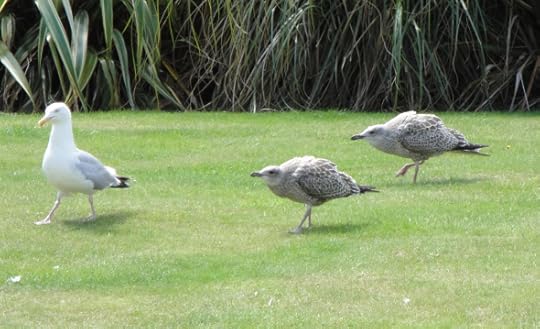
Having tried and failed with the battering-ram approach, our very own Secretary to the Cornwall County Council Presidium tried reasoning. He wrote of the very real dangers to life and limb, and enclosed some press clippings of seagulls apparently attacking human beings.
While loving the aforementioned Daphne du Maurier, I did feel that he and the various ‘local rags’ might be confusing fact with fiction. I explained that if idiot tourists waved their Cornish Pasties around, like bait in a trap, they shouldn’t be surprised if hungry birds tried to steal them from their hands. I then went on to ask the sixty-four-thousand-dollar question. . . Which is the more aggressive, a hungry creature or a well-fed creature?
I didn’t hear back, for another eighteen months, but then I received another missive from one of Stalin’s Presidium protégés, ordering me to stop feeding the seagulls; it was almost like ‘Groundgull Day’. I referred him to my earlier correspondence with the council, and am still awaiting his reply.
So that’s where we are now; a sort of Cold War stand-off, Cornish style.
As with the cessation to hostilities in Korea, our cessation to hostilities has never been formally negotiated. My neighbour and I still glare at each other across the spike-encrusted thirty-eighth paling, and the council still sit seething in their Kremlin chambers; presumably awaiting a time when they can bring in some sort of legally enforceable bye-law to prevent anyone flouting their authority and feeding birds.
Meanwhile, ‘Jackie’ shows no sign of moderating her procreational activities, and continues to tap on the door at shamelessly regular intervals.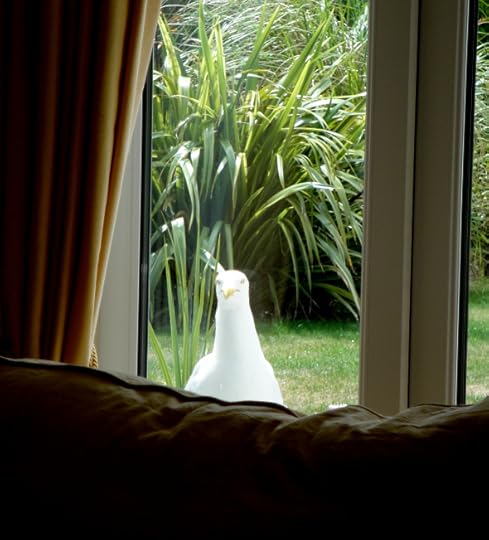
Thank goodness it’s only owls and rooks that have Parliaments.
Have a good one.

September 1, 2012
Is this the Missing Link?
August 27, 2012
On morality, good deeds, and how my dislike of barbecues ruined a marriage.
Whatever we do in life, there are always consequences. ‘What we do in life echoes in eternity’ may be a slightly grandiose quotation from an historically inaccurate feature film, but to a certain extent the sentiment holds true. It is a lesson that I learnt many years ago, and one that I wrote about in Flying with Cuckoos. Usually, if we do good things good consequences result, and vice versa, but every now and then an exception that proves the rule raises its disagreeable head. This was that exception, and it all started some years ago with a barbecue.
Now, before I get to that, allow me to explode a myth. I know that, when it comes to barbecues, men have a popular image of themselves as the hunter and provider; returning to a hungry family with all manner of slaughtered game, which they then proceed to cook over smouldering charcoal, on a balmy summer’s day, and under the collective and worshipful gaze of enamoured spouse and grateful offspring.
It is a fanciful image that has resulted in untold cases of Salmonellaand Botulism, spread by middle-aged couch potatoes wearing toque hats, and aprons adorned with crude motifs; prodding at raw sausages and pink chicken, with a wicked-looking fork in one hand and a can of Foster’s in the other.

Well that’s not for me: never has been, and never will be.
If pressed, I’ll carry the barbecue back from the store. I’ll even assemble it and light the charcoal, but after that it’s all down to the person who knows how best to cook the food, without troubling the local public health inspector, and that is definitely not me.
You see, my wife is the cook in our house. She’s better than good, and I’m worse than useless. So why would we suddenly reverse roles, just because this is the one day in the British calendar year when the sun condescends to show its face?
In truth I can just about put up with my own barbecues, but I have never enjoyed other people’s. Forgetting the flies and ants and wasps, I dislike sitting on canvas chairs, trying to balance a paper plate on my lap, while failing to sever pieces of leather-like steak with a dull plastic knife, or vainly trying to spear cremated sausages with a blunt plastic fork.
Then there’s the small-talk, which I was never much good at. I always found it mind-numbingly tedious to have to make complimentary murmuring sounds whenever the hosts start boasting about the staggering achievements of their obnoxious brat, or, worse still, moves on to give a blow-by-blow account of how they single-handedly completed yet another ghastly home improvement.

Which was one of the reasons I bought a new gas barbecue. I figured that, with a new gas barbecue, we could invite others to visit us, rather than us visit them. I also figured that, with a gas barbecue, my wife wouldn’t need me to light it and tend it, and I could therefore slope off to my study at an opportune moment.
But that left me with the charcoal barbecue, which, due to my aforementioned dislike of barbecues, was almost new and in perfect condition. I offered it to members of the family, I offered it to friends.
Nobody wanted it, and so I finally took it to the local council rubbish tip.
Council rubbish tips; now there’s a culture shock if ever I saw one. They’ve changed so dramatically, and the staff have become so dictatorial in such a short space of time. In days gone by we would arrive, dump our rubbish, and immediately drive off; leaving a man with a pitchfork to decide what was worth keeping and what wasn’t, but not today. Today the staff have become a sort of ‘green police’; inspecting the rubbish, item by item, and then brusquely directing the discarder to a dozen different receptacles.
I know this recycling mania is all about our greater awareness for the needs of the environment, and I applaud the initiative, but a little servility wouldn’t go amiss. I can’t believe that even the likes of Orwell could have foreseen the humble refuse collectorbecoming such a blunt and offensive caricature of ‘Big Brother’.

But back to my nearly-new barbecue, loaded onto the back of my gas-guzzling and environmentally unfriendly four-by-four. I was standing at the entrance to the local rubbish tip, now made-over and rebranded as a regional recycling centre, awaiting that all-important permission to proceed to the metals receptacle.
“What yer got there then?”
He was a surly individual, dressed in council dungarees and clutching the obligatory pitchfork. He rubbed his chin as he spoke, and squinted hard at me as I answered. If he was hoping to intimidate, it worked; that pitchfork looked dangerous.
“Err, um, it’s a barbecue.”
“What’s wrong wiv it?”
“Nothing.”
I could see the wheels going around as he processed the information. Understandably, the cogs refused to engage. As he continued to stare blankly back at me, I decided to explain further.
“I just bought a new gas barbecue. My wife prefers gas, but there’s nothing wrong with this. . . look.”
I dragged it from the car and stood it on the tarmac. He rubbed his chin again, and circled the beast, as if hoping to spot some sort of blemish or flaw. He found none, and nodded sagely as he spoke.
“Mmm, looks alright.”
I felt I should say something.
“You can have it, if you want; there’s really nothing wrong with it.”
He stood in deep contemplation for a few tension-loaded seconds, and then finally prodded the pitchfork in the direction of the mobile cabin that served the dual roles of office and canteen.
“Put it over there.”

I dragged it over to the indicated area, and then shuffled uncomfortably back to the car. I called out a cheery goodbye, saw his answering nod and thought I saw the flicker of a smile, but it could have been wind. Seconds after that I was away.
I didn’t give it another thought, but a couple of months later I was back at the tip. When he strode over to me, I smiled. He didn’t smile back.
“That bloody barbecue!”
“I’m sorry?”
“Your bloody barbecue. . . it’s ruined my life.”
I assumed he was joking. I joked back.
“Don’t tell me; she’s got you cooking every weekend.”
“Naw. . . she’s left me, and it’s all your bloody fault.”
It only took one glance to see that he wasn’t joking, and he was still carrying that pitchfork. I warily eyed the twin prongs, and began mentally recalling my unarmed combat training. Step sideways, parry, step inside the radius, disable. I was hoping I wouldn’t need to use it.
“I’m sorry, what do you mean?”
Suddenly he dropped the pitchfork, and all the misery in him came gushing out.
Apparently he’d taken my old barbecue home, and on the following weekend he and his wife had invited the neighbours round for a lazy barbecue and an afternoon in the garden. Unfortunately, the neighbours had brought a friend with them. My man with the pitchfork had thought nothing of it, but a week later his wife left him and ran off with the neighbour’s friend.
I spent the next ten minutes not knowing whether to laugh or cry, while failing to extricate myself from the unhappy result of my ‘good deed’. It was no good telling him that she must have been unhappy long before he bought the barbecue home. No good, either, trying to tell him that it was better to know sooner rather than later, and he could now look for someone faithful. He was devastated, and it was all down to me and that bloody barbecue!
I hastily tipped the rubbish into the nearest skip. Whether it was the right skip or not, he didn’t seem to notice or care. Then I jumped back into the car, and said.
“I’m really sorry.”
“Back to your wife now, I suppose?”
“Err, yes.”
“I’m not.”
I left him to his misery, and didn’t go back to the tip for months.

I doubt that even Aesop could have found a moral to the story, and so I’m not going to try, but a few months ago I was back at the tip. He stopped me, and proudly told me that he had a new wife. He still didn’t look any happier, but I heartily congratulated him and his new wife, and then ran for it, because I’d just finished tipping our now worn-out gas barbecue into the metals skip.
Have a good one

August 22, 2012
On why and how I wrote The Folks at Fifty-Eight
I always wanted to write spy novels, but didn’t just want to write about plots to steal a particular document or piece of equipment, with artificially loaded tension, and frantic car chases, and mass slaughter. I felt that I needed to give the reader something more.
I wanted my readers to enjoy the thrills and spills, but I also wanted to make them think about the reality, rather than merely breathe a sigh of relief when the hero finally triumphs and then saunters off into the sunset.
I also wanted to steer clear of gimmicky equipment and fantasy worlds and stereotypical Russian baddies and western goodies. John Le Carré brilliantly captured the grim reality of espionage at the coal face, with The Spy who came in from the Cold. Le Carré later developed Smiley and Lacon, a higher political level, but again the perspective was solely western and the plots more concerned with fire-fighting then strategy.
Not that I am in any way decrying or comparing myself to Le Carré. The man is one of the all-time great writers, and I am a major fan. There are relatively knowledgeable people who actually believe that ‘Moscow Centre’ and ‘The Circus’ existed, and that is a tribute to Le Carre’s storytelling genius, but for me to succeed, as a new and independent author in an already cluttered genre, I had to come up with something different.
Neither did I want to do an all-action tale. I accept that action and suspense are essential parts of any espionage thriller, and The Folks at Fifty-Eight offers its fair share of both, but it would be difficult for anyone to introduce a new Cold War action hero who didn’t in some way reek of James Bond, or a blunt instrument who didn’t remind us of Len Deighton’s Harry Palmer.
And so I decided to do espionage in a different way. I decided to write about the immediate post-war period, before grubby spies and the infamous KGB became ‘fashionable’. I also decided to introduce readers to the reasons and characters that brought about the Cold War, rather than the physical, Checkpoint Charlie, barbed-wire stand-off that it became.
In short, I wanted to write spy novels that both entertained and, at the same time, told something of the shocking reality behind the perceived glamour.
And so I hit on the idea of a trilogy that looked at the Cold War’s origins and escalation from both east and west perspectives. I decided to show both points of view, and employ a more thoughtful and realistic approach to plot construction and character motivation.
And so The Etzel Trilogy was born; with plots and characters mirroring real, but little-known, people and events, and with the fictitious thread of each story carefully woven into a factual backcloth.
The Folks at Fifty-Eight is the first part, and largely views the escalation from an American perspective. Hierarchies of Greed, due out next year, will largely view the conflict’s origins from the Soviet Union’s perspective, and The Dreams of Etzel, due out in 2014, will complete the trilogy and show something of the British role and perspective.
Each can be viewed as part of a trilogy or as autonomous novels, and each will tell true, but little-known, stories from the early Cold War. Each will provide all the action, intrigue, sex, and suspense, expected of the genre, while making it difficult for even aficionados and modern history buffs to identify exactly where fact ends and fiction begins.
I very much hope that you will read and enjoy.
Have a good one.
Don’t have a Kindle? Don’t worry, Amazon have apps for your Android phone or tablet, iPad, iPhone, PC, Mac, BlackBerry, or Windows Phone 7

August 18, 2012
‘Quality Literature’ – A guide to worth, or elitist twaddle?
Quality is one of those words that can never be defined in terms that completely satisfy everyone. During my years in the armed forces it simply described functional and hardwearing equipment; accurate side-arms that didn’t jam, comfortable boots that lasted, and so on. Then, during my years in commerce, the advertising agencies adopted it and quickly expanded its definition.
At the beginning of the nineteen-eighties it was the stock word for just about every marketing slogan the computer industry ever coined. By the end of that decade it had become a ‘buzz word’ for everything from good working practice to meaningful and fulfilling leisure time.
I love the feel and resonance of the word. To me it conjures images of soft-leather chairs, and polished-mahogany tables, sumptuous living, expensive cigars, and twenty-year-old scotch. It can be as pretentious as ‘bling’ and emotive as an exclamation, or as informative as the bluntest adjective.
Most will concede it is entirely subjective, and yet, when it comes to literature, its use seems to stir up all manner of snobbery and polarised opinion.
There are still literary agencies, on both sides of the Atlantic, who insist they will only accept submissions of ‘quality literature’, although, and at the same time, failing to properly explain their precise definition of the term.
[image error]
Some will insist that popular literature cannot be quality literature, and yet I have the complete works of William Shakespeare sitting on my bookshelves, as do millions like me from across the globe. Perhaps, as with certain types of rain in a drought, Shakespeare’s popularity is the wrong kind of popularity.
Maybe it is all to do with fashion. After all, D.H. Lawrence was considered a purveyor of ‘filth and pornography’ not so very long ago, whereas today the purists will excuse Lawrence’s previous denigration, at the hands of the self-appointed guardians of quality literature, by claiming that. . . ‘The man was obviously born before the world was ready to embrace his genius’.
Maybe the cynical among us are right. Maybe quality literature is a term we use to describe the books we all like to say we’ve read, rather than the books we actually like to read. Perhaps there has to be an element of ‘donning the hair shirt’ about settling into quality literature.
Me. . . ? I change my definition every couple of years.
[image error]
For example. . . At the age of five, if anyone had claimed that Enid Blyton’s Noddy series was anything but quality literature, I would have hit them with my teddy bear. By the time I had reached the grand old age of ten, Noddy had been supplanted by The Famous Five and dear old Shadow the Sheepdog. When I was thirteen, Charles Dickens had assumed the mantle, but then, at the age of seventeen, Thomas Hardy’s Mayor of Casterbridge was ‘my speed’. At nineteen, a politically radical postman from Derbyshire, named J.T. Edson, and the exploits of cowboy hero and fastest gun ‘Dusty Fog’ had become my literature of choice. Dear old J.T. was in turn supplanted by Louis L’Amour, and he by D.H. Lawrence and a little-known but much-read author named Burton Wohl, whose best-selling novel, A Cold Wind in August, was roundly castigated as ‘filthy dross’.
[image error]
Now who does that remind you of, today?
Some may claim the authors mentioned are a hotchpotch, writing everything from the so-called classics and quality literature to pornography and pulp fiction, but each has, at different times in my life, drawn me, and enthralled me, and enlightened me, and transported me, and devoured me.
By my definition, any book that has the power to do such a thing constitutes quality literature.
So there you have it. Quality literature. Something to do with age, something to do with time, something to do with fashion, something to do with influence, something to do with environment, something to do with education, something to do with creativity, something to do with prose style, something to do with culture, something to do with the literary establishment, something to do with peer pressure, something to do with interpretation, something to do with emotivity.
But, and most importantly. . . Everything to do with you, the individual.
Have a good one.

August 16, 2012
An Apology and an Opportunity
For those of you who were kind enough to comment on my previous posts, I can only apologize for not answering sooner. This was due to my ignorance of modern social networking and blogging conventions, rather than any ignorance of social skills and etiquette or lack of appreciation for you taking the time to comment. I hope that you will forgive my tardiness. I will try to be more punctual in responding to any future comments.
In the meantime, the following extract is from my memoir Flying with Cuckoos, and is something of ‘a tease’ being used as ‘a tease’. It tells a little of one of the most embarrassing incidents of my youth, and anyone who can recall the emotional minefields of their own puberty will probably recall similar incidents, although, I doubt they will be quite as embarrassing.
‘Suddenly, in the middle of that open field and in front of an appreciative audience of more than fifty sex-obsessed young men, Albrighton Sally began an impromptu striptease.
She began the show innocuously enough, by casually loosening one of the two remaining buttons on her blouse and then leaning forward to accentuate the resulting exposure. However, when we greeted that with raucous enthusiasm, she kicked off her shoes and removed the blouse, before unzipping the red tartan miniskirt and slowly allowing it to follow the blouse to the floor.
I never did discover why she did it; for a laugh or a bet, I suppose. Perhaps she’d been drinking, or was simply feeling playful, or maybe all those rumours and the answers to so many of our prayers were true. Maybe she was a nymphomaniac. I didn’t know, and at that moment I didn’t all that much care, because I was like everyone else; looking on in wide-eyed astonishment and numb appreciation, while she weaved and twirled in a provocative display of simulated arousal.
That was, I might add, until two sets of scarlet-tipped fingers arrived at the penultimate item of flimsy underwear, and began to play such a disgracefully-provocative game of tease and torment that one of her admiring audience found it impossible to remain at a gentlemanly distance. We could hear him clattering down the stairs, clumsily negotiating the individual steps three at a time, while loudly and crudely announcing his intention. . . that was when all hell broke loose.
Nobody would later own up to being the first person to move, but before anybody had time to identify the culprit, question the wisdom, or even think, the entire apprentice entry followed suit. We stampeding down those stairs like a herd of amorous lemmings, then charged across the road, over the fence and lane beyond, and on into field; fifty young men, with only one thought on their minds, all in frantic pursuit of a wiggling, giggling, half-naked, slip of a girl.
Neither could anybody later recall just why we had all suddenly started at once. We may have been sex mad, but were a long way from potential rapists. However, having anticipated, or, more likely, schemingly calculated our red-blooded reaction, the young temptress gathered her clothes and was away; loudly shrieking, as she ran across the field.
Even barefoot, and labouring under the handicap of carrying shoes and clothing, she had reached the edge of the first field before most had reached the first-floor stairwell, and could she run. She flew across that first field, and easily left most of the apprentice entry floundering in her wake. She negotiated the far fence and then began running across the next field, leaving those few remaining apprentices who foolishly continued the chase, some way behind and hopelessly outpaced. . . With the notable exception of one, fleet-footed, idiot.
As I mentioned, I was an excellent cross-country runner, and, for an insane reason that must have seemed important at the time, was out to prove that to the rest. It wasn’t until we started into the third field, however, that I began to compare my own fleet-of-foot position to the ponderous progress of the chasing pack.
And as the others fell farther and farther behind, and I drew nearer and nearer to Sally, it slowly dawned on me that I might have to deal with this giggling femme fatale without the benefit of their support.
That was when anxiety set in, and previously-sturdy legs became inexplicably weak.
As we threaded our way through the woods, and crossed the third field, anxiety graduated to panic, because I could see that Sally was beginning to tire; or perhaps, more worryingly, beginning to fancy her chances of coping with this loneliest of long-distance runners. Either way, there was no doubt that she had slowed to little more than a trot, and no doubt either that I was going to be alone and unaided when I finally caught up with her.
As we crossed the fourth field, the distance between us was less than twenty paces. The distant pack accepted defeat, and came to a halt, and I frantically considered my all-too limited choices.
You see, I was the sort of sexual ignoramus who became hopelessly intimidated by the merest smile on a pretty girl’s lips. I had regularly turned crimson when the girls at school made double-entendres and laughed at my naiveté, had only been kissed on the mouth once in my life, and hadn’t kissed back or had the first idea where to put my hands. I hadn’t even known whether I ought to say ‘thank you’ afterwards.
Yet here I was; a poor, ignorant, foolhardy dupe on the brink of the abyss, or in this case a public alfresco bedding of the most notorious man-eater in the district. The great white hunter without a trophy to his name; hopelessly ensnared in his own stupid trap. The rampant Alpha Male, about to mount the exhausted female; with no idea of how to begin proceedings, let alone decide exactly what went where and in which order.
I tried to clear my mind as that all-important gap, between me and carnal catastrophe narrowed. At this most desperate of moments any soul-searching or self-recrimination was academic. Right now I had more important concerns. Right now I had to do something, anything, to find some way of avoiding this looming disaster. Right now I had to think of something, anything that might allow me to disentangle myself from this absurd predicament, without the loss of either virgin naiveté or hard-won prestige, or more than likely both.
I considered slowing to an equally-unhurried pace, but discarded the idea, because others, although some distance away, were watching my progress, and aware of my long-distance running credentials. The second alternative was to stop, and allow her to escape, but my already shaky reputation couldn’t possibly withstand the fallout from such an inglorious action. Not only that, but I wasn’t certain that Sally would take the opportunity, should I choose to present it.
As the pace dropped ever more, and my farcical hot-pursuit turned into a comically protracted procession, the knowledge of what the pack, and the young seductress herself, would expect of me when I finally caught her, was filling me with terror.
There was no alternative. Whatever had to be had to be. The dictates of masculinity demanded that I do it. So many million years of mankind’s evolution demanded that I do it. The honour of the apprentice wing demanded that I do it. My own self-respect demanded that I do it. Even the wiggling and giggling femme fatale herself was seemingly demanding that I do it. There was no other course of action that had come to mind within the time available, or none that offered any lasting credibility. I would simply have to steel my nerve and damn well do it.’
Flying with Cuckoos is available for FREE download from Amazon, on the 17th and 18th of August 2012.
Don’t worry if you don’t have a Kindle, Amazon offers Free reading apps for iphone, ipod touch, Android, Windows, Mac, ipad, and Android tablet.

August 12, 2012
On freedom, a very special parrot named William, and Indie publishing
It appears that Indie publishing has somehow become all things to all men.
There are those who claim it has freed the artist from the shackles of conventional publishing, others who claim it has brought a decline in literary standards, the like of which we have never seen before.
For many, previously established authors, it is the devil. For those who once sat languishing in Rejection Slip Land* it is deliverance. For those who have published and been damned, by the fickle whims of amateur critic and book-buying public, it is a cruel and heartless judge of literacy and creativity.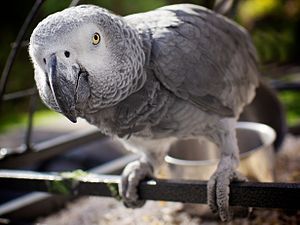
But, there is another way to view the Indie revolution, and to do that we first need to meet William.
I met William on a number of occasions, and considered him a very special parrot and a very special character. Sitting in his cage by the bar, of the aptly named Port William Hotel in the picturesque North Cornish hamlet of Trebarwith Strand, William entertained passing clientele with his own special and unarguably ribald, commentary.
Each syllable had been learnt, in true parrot-fashion style, from a succession of smiling faces, many of whom were the worse for drink. They would stand before his cage, and repeat vulgar and inane words and phrases, ad nauseam, until he had dutifully mimicked the sounds. Only when he had modulated his own high-pitched squawk with their inane commentary would they chortle in triumph and leave William to his solitude.
However, few of those who peered through the bars understood that lurking beyond William’s chirpy and cheerful facade was a depressive bird, with a dark and unhappy secret. What each of them failed to realise was that when William was alone he would cling to the bars of his cage, and peer out of the window across the rocky North Cornwall coastline to the Atlantic Ocean beyond.
In those moments of loneliness and solitude William would dream his dreams of fresh air and freedom, and remember a time long ago when he had been as free as the endless expanse of fresh air and space that he now so secretly coveted.
But then, one day, two humble cleaners gave William the opportunity he had dreamed of during all those years of captivity. While cleaning his cage, one cleaner had let him out to wander around the bar area, not realising that the other cleaner had left the door to the outside world open.
William took his chance. Like a shot he was out of the door, into the air, and away.
He flew first over the cove and along the cliffs, and for a while they thought he might return, but then William did the strangest thing. . . he turned to the west and headed out to sea.
It was only a matter of seconds before he began to tire; only a matter of a few hundred yards before untrained wings, left weak through so many years in that cage, began to fail him.
William was swallowed by the Atlantic Ocean that day. Some say he was disorientated and lost his bearings, others that he was just a bird-brained parrot who knew not what he was doing or why.
I disagreed. I believe that William chose freedom over servitude. I believe that, whether he had made it all the way to his homeland and natural habitat or drowned in the Atlantic Ocean, William cared little, because for those few brief moments of fresh air and ozone he was truly free.
I choose to believe that, as he headed out to sea, William resolved that he would never again be confined to amusing the drunk and the moronic from an ugly cage in a smoke-filled bar.
 And that, to a certain extent, is how I and a great many other Indie authors feel.
And that, to a certain extent, is how I and a great many other Indie authors feel.
We have no idea how successful we may or may not become. We may become best-selling novelists, or sink and drown in the deepest oceans of our own inadequacy, but there is one thing that we are certain of. . . We will never again be caged, and abused, and patronised, and ignored, by agents and publishers and those inane guardians of the literary slush piles.
Have a good one.
MPC.
*For those unfamiliar with the term, Rejection Slip Land did actually exist. It was a dreary and depressing island, with many hundreds of thousands of brutalised subjects. All were furiously writing the next blockbuster novel, and all had applied for literary asylum with less astringent regimes. It boasted a governing Presidium of six, who occasionally accepted proposals but rarely acceded to the enclosed entreatment, and an Olympic team of one, whose entry for the ‘20 yard dash from study to greet the postman’ was declined on the basis of an incorrectly worded application (I blamed his editor).

August 10, 2012
Update to my last Post
The publisher has taken the unprecedented step of bringing the dates forward by a day in response to overwhelming public demand.

August 9, 2012
On those who have amazed and inspired me during my life
Given my earlier comments, about not liking ‘the celebrity culture’, you may not be surprised to learn that I have worshipped few heroes in my life. My earliest recollection of admiration for an unrelated human being was Sir Winston Churchill.
I can still recall the fit of melancholy that enveloped me as I stood on a frozen Sunningdale station platform in January of 1965, to watch the great man’s coffin pass by on that final journey to his eternal resting place.
It was about the same time when my immediate future was decided, in the Headmaster’s study that day, and if you have no idea as to what I’m talking about you should read Flying with Cuckoos. However, far from the embarrassment of that demoralising experience, my recollection of Churchill was of a man of boundless charisma, and a life filled with achievement and inspiration.
However, far from the embarrassment of that demoralising experience, my recollection of Churchill was of a man of boundless charisma, and a life filled with achievement and inspiration.
Since that time I have added four more inspirational figures to my elite club of ‘celebrities’ and all for different reasons.
Audrey Hepburn was the second ‘celebrity’ to be added to the short list, because she was quite simply the most beautiful movie star of all time; dainty and delicate and impish and stylish and quite, quite beautiful. She has inspired legions of celebrity wannabes, but to my mind there will only ever be one Audrey Hepburn.
Next came Margaret Thatcher, who was anything but dainty and delicate, and I am sure that many in Britain consider her something akin to the antichrist. I have no intention of getting into political argument, but whatever else people may or may not think about Thatcher, one thing is indisputable. She picked up the crown of Britain’s democratic process, from where Ted Heath had left it lying in the gutter, in 1974, and restored It to its rightful place. Margaret Thatcher makes my list for that act alone.
Then comes Seve Ballesteros, because I love sport, and I love golf, and I love charismatic characters. I once met him, and even had the good fortune to play one of my finest ever golf shots under the gaze of the great man. It was a major thrill. I was so sad to see his life cut short by such a terrible disease, but grateful that he has inspired others to take up the battle against cancer. They can be contacted on. . .
http://www.seveballesterosfoundation.org/uk/utilities/contact-us/seve-contact-us
Last, but by no means least, in my special list, is Her Majesty Queen Elizabeth II. I have twice been fortunate enough to meet and speak to Her Majesty, and on both occasions she left me in awe. That she has so graciously and dutifully served this country for over sixty years, and continues to do so, is both inspiring and humbling. Long may she continue to reign.
That’s about it. My short list and my first- and last-ever post on ‘celebrities’. . .

August 5, 2012
Fifty Shades of Green
With the phenomenal success of the author E. L. James, and her Fifty Shades Trilogy, I was saddened to see so many otherwise excellent writers and novelists queuing to take pot shots at both her and her work.
Have these people become so pretentious and arrogant, or so envious, or so greedy, or so threatened, that they feel the need to castigate the work of a fellow author? I am sure that, at some stage, each of them must have suffered from cruel and scathing criticisms of their own work. Can they not remember how hurtful and soul destroying such criticism can be, or do they think that by ‘knocking the competition’ they will somehow further their own careers and promote their own work?
In recent years, we in the west seem to have developed a very cruel streak, and this business of brutal critical analysis, and make no mistake it is a business, has always held some sort of place in literature, as it has in life. It is, however, only recently that the lynch-mob mentality of scathing literary criticism has begun to infect the authorial ranks.
We, as authors, are the poorer for it.
I make it a principle never to comment on the work of my fellow authors, and I will make no exception here, but I will say this. . . Fifty Shades of Grey has performed a tremendous service for literature, because it has brought millions of people, who otherwise may never have read a novel or purchased an e-reader, and introduced or re-introduced them to the joy of losing oneself among the pages of a novel.
I must admit that when I read of so many millions buying the books of E.L. James, rather than mine, I am also a little green, but my green is a healthy shade of green. My green is the natural envy of one novelist for the staggering success of another. It does not, and I hope it never will, manifest itself in vitriol and derision.
As a child I was taken to my local cinema to see the feature cartoon Bambi. That film, as with so many of Walt Disney’s masterpieces, left me with fond memories and enduring lessons. They are memories and lessons that I have carried with me throughout life. In Bambi it was the endearing ‘Thumper’ who so awkwardly and famously said. . .
“If you can’t say something nice, don’t say nothin’ at all!”
Where is today’s moral guidance to come from, if it is not from the very people who write to entertain, to teach, to guide, to fuel imagination, and to inspire?
Have a good one.







